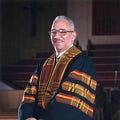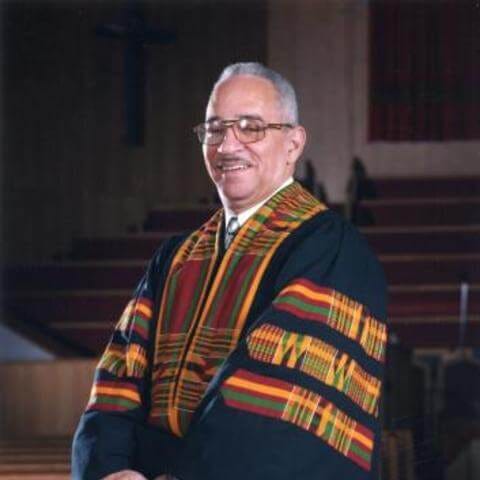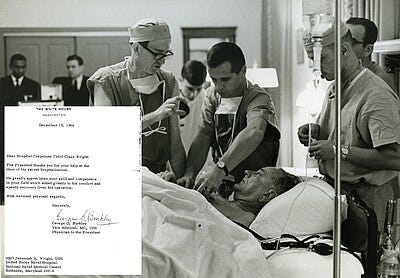Today In Black History: Rev. Dr. Jeremiah A. Wright, Jr.
Formidable and accomplished former pastor for Barack and Michelle Obama
Issue #733 Today In Black History, Wednesday, September 25, 2024
Did you know that you can listen to each “We Are Speaking” post on the Substack App? Download the app!
Please share and subscribe to help us grow our publication.
If you like us, REALLY like us, please click the “Like” button at the end of this post!
We appreciate your support!
Many people only know about Rev. Dr. Jeremiah Wright as the former pastor of Barack and Michelle Obama. Because some of his statements and sermons were quoted out of context, then-Senator Obama was forced to disavow Rev. Wright soon after Obama’s presidential campaign began.
There is much more to know about this famous clergyman.
Rev. Dr. Jeremiah Alvesta Wright Jr. was born on September 22, 1941, in Philadelphia, Pennsylvania. He is the son of Rev. Jeremiah Wright Sr., a pastor, and Dr. Mary Henderson Wright, a professional educator. Growing up in a religious household, Wright was inherently influenced by the intersection of faith and social activism.
He attended Virginia Union University before joining the United States Marine Corps and later the United States Navy, where he served as a cardiopulmonary technician. Wright attended President Lyndon Johnson’s surgery and assisted with the anesthesiology functions.
Jeremiah Wright is standing behind the IV pole while he attends to President Johnson.
After six years in the military, Wright transferred to Howard University, completing his undergraduate studies and receiving his first master’s degree. His second master’s degree in the History of Religions was from the University of Chicago Divinity School. His doctorate was received from the United Theological Seminary under Dr. Samuel DeWitt Proctor. In addition to his four earned degrees, Rev. Dr. Wright has received nine honorary doctorates.
In 1972, Rev. Wright became the pastor of Trinity United Church of Christ in Chicago, Illinois. Under his leadership, the church grew from a modest congregation of 87 members to over 8,000. Wright’s innovative and inclusive approach to worship and community outreach made Trinity a beacon of Black theological thought, social activism, and cultural pride.
Rev. Wright is best known for his advocacy of Black Liberation Theology, a movement that interprets Christian doctrine through the lens of the Black experience in America and seeks to combat systemic injustice. Drawing from the works of theologians like James Cone, Wright's sermons often addressed racial oppression, economic disparity, and political disenfranchisement. His powerful oratory did not shy away from calling out societal sins, making his messages both impactful and, at times, polarizing.
Rev. Wright gained national notoriety during the 2008 presidential campaign of then-Senator Barack Obama. Excerpts of his past sermons were widely circulated, sparking controversy and intense media scrutiny. Phrases like "God damn America" were taken out of the context in which Wright was condemning America's historical injustices and systemic racism. Despite the controversy, Wright stood by his beliefs, insisting that his words were rooted in a deep-seated love for his country and a desire to see it live up to its founding ideals.
Even after retiring in 2008, Rev. Wright’s influence continues to resonate. He remains a sought-after speaker and a respected elder in the Black church community. His impact is evident in the ongoing social justice pursuits, the thriving congregational life at Trinity United Church of Christ, and the continued relevance of Black Liberation Theology.
Today In Black History
In 1861, the Secretary of the Navy authorized the enlistment of African American slaves into the Union Navy. The enlistees could achieve no rank higher than "boys" and receive pay of one ration per day and $10 per month.
In 1904, Charles Follis became the first Black man to sign a contract to play professional football on an integrated team when he signed with the Shelby Blues of the Ohio League.
In 1967, Congress created the first all-Black university, Howard University, in Washington, D.C.
In 1962, the 8th Black church in six weeks was destroyed by fire in Georgia.
In 1974, Barbara W. Hancock became the first Black woman named a White House Fellow.
In 1988, American sprinter Florence Griffith Joyner won the women’s 100m race with an Olympic record of 10:54 seconds at the Seoul Games.
Our paid subscribers are encouraged to discuss this post in our W.A.S. Chat Community.
Join Pamela Hilliard Owens’s subscriber chat
Available in the Substack app and on the web
You are also welcome to view “We Are Speaking” in Substack Notes. You can also read other Substack publications without subscribing to them when you join Notes.






